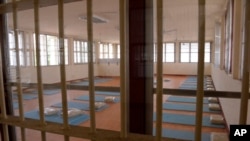Thailand recorded its highest number of coronavirus infections Thursday since the pandemic began after Bangkok prisons were found riddled with COVID-19, threatening an extension of a partial lockdown of the country that is hammering the economy.
The latest wave of the virus emerged in April, dynamized by clusters at nightspots popular with Bangkok's rich.
It has forced the government of Prayuth Chan-ocha to order restaurants and bars to close and urge people to stay at home, leaving Thailand's tourist and services economy on the brink.
The country reported 4,887 infections Thursday, a record daily high after 2,835 prisoners tested positive at two jails in Bangkok.
The current outbreak has left more than 400 dead so far, with hospital beds full and the government scrambling to roll out vaccines to a public that is increasingly anxious about the double hit of a health and economic crisis just as the country was preparing to reopen to foreign tourists.
Prayuth this week promised to vaccinate everyone, insisting "herd immunity" through inoculation was the only way through the pandemic.
But health authorities say just 640,000 people out of a population of nearly 70 million have received two vaccine jabs.
Thailand has approved vaccines from Moderna, Sinovac, Johnson & Johnson and AstraZeneca. The kingdom will produce the AstraZeneca vaccine under a long-term license.
But for now, it is racing to secure tens of millions of emergency doses to begin mass vaccinations in June, after going slow at the start of the year in its procurement when the virus appeared to be beaten back.
Airport worker Sarayut Jumpa said he is one of the lucky ones to have received a second dose — in his case, the Chinese-made Sinovac vaccine — administered at Bangkok's main airport, Suvarnabhumi, where check-ins have been adapted to process inoculations.
"The vaccine might not protect us 100%, but studies show the sickness will now be less severe if I contract the virus," Sarayut said, adding that his next task was to convince his parents the vaccine is safe. The slow rollout in the kingdom has been matched by internet misinformation about the efficacy of vaccines.
With upward of 4,000 airport workers vaccinated and travelers few and far between, the airport is now ready to be used by the public as soon as the government gives the order.
"Before the pandemic, we used to receive 200,000 international travelers a day, now only about a thousand a day," said Kittipong Kittikachorn, the airport's deputy general manager.
"The airport already has all the necessary amenities ready to turn into a vaccination station."
Thailand thought it had escaped the worst of the public health crisis posed by the coronavirus through border closures and strict 14-day quarantines.
Those measures instead crippled an economy that counts between a fifth and a quarter of its revenue from tourism.
Thailand's GDP withered by more than 6% last year. Hopes of a third-quarter rebound this year appear to be in jeopardy after the latest outbreak.
Thai authorities are insisting on an October reopening date to vaccinated tourists, with Phuket Island aiming to reopen July 1 after a privately driven vaccination campaign.
But the new wave has cast that into doubt. Hotels that have staggered on through a year of lost income have been forced to close again, while bars, restaurants and nightclubs in a country renowned for its wild nightlife have had to let staff go.
The crisis is now fast becoming a serious political problem for Prayuth, an unpopular ex-army chief who seized power in a 2014 coup and has since been reinvented as an elected premier.
"Whether or not the economy can recover will depend on the number of people vaccinated," Krid Kanjanakit, 36, a hotel owner in the resort town of Pattaya, told VOA News.
"But the problem is, this government moves slowly with everything."
Opposition MPs Thursday urged the Office of National Anti-Corruption Commission to investigate Prayuth for allegedly failing to procure vaccines on time, resulting in unnecessary fatalities.




